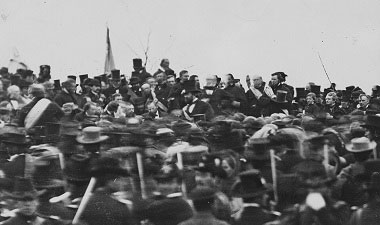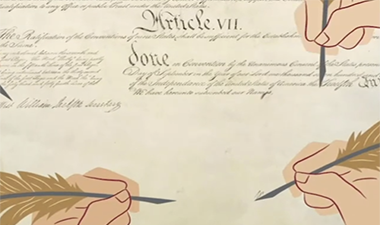
By Jeffrey Rosen CEO Emeritus of the National Constitution Center
Jeffrey Rosen notes that the Founders viewed the pursuit of happiness as a lifelong quest for character improvement, and their belief that happiness is always something to be pursued rather than obtained.
In 1815, the head of a boarding school in Maine wrote to Thomas Jefferson asking for some wisdom to pass along to his students. Jefferson responded by sending a passage from a Stoic self-help manual, Cicero’s Tusculan Disputations, that he had copied down as a teenager to console himself after his father’s death. “If the Wise, be the happy man, as these sages say,” Jefferson paraphrased, “he must be virtuous too; for, without virtue, happiness cannot be.”
Who were these other sages? And what was the connection Jefferson saw between virtue and happiness? A reading list that Jefferson first drafted in 1771, five years before he wrote the Declaration of Independence, provides the beginning of an answer. Jefferson sent the list to his friend Robert Skipwith, who had asked for books to include in a private library. There, under the category of “religion,” Jefferson listed his favorite moral philosophers—the “sages” of his letter. They included Cicero as well as the classical writers Xenophon, Epictetus, Marcus Aurelius, and Seneca and the Enlightenment writers John Locke, David Hume, Lord Bolingbroke, and Lord Kames.
At its core, the Founders viewed the pursuit of happiness as a lifelong quest for character improvement, which requires a commitment to practicing the daily habits that lead to self-regulation, emotional intelligence, flourishing, and growth. Understood in these terms, happiness is always something to be pursued rather than obtained—a quest rather than a destination.
Inspired by ancient philosophers, they described this quest as a dramatic struggle between reason and passion. The Greek words for reason and emotion are logos and pathos, respectively, so for the Founders, passion was a synonym for emotion. The Founders believed not that we should lack emotion, only that we should manage our emotions in productive ways.
“The due Government of the passions has been considered in all ages as a most valuable acquisition,” Abigail Adams warned her son John Quincy Adams, emphasizing, in particular, the importance of using reason to subdue “the passion of Anger.” Her conclusion: “Having once obtained this self government, you will find a foundation laid for happiness to yourself and usefulness to Mankind.”
In his writings on happiness, Plato argued that we should use our faculty of reason, located in the head, to moderate and temper our faculties of passion, located near the heart, and appetite, in the stomach. When all three faculties of the soul were in harmony, Plato maintained, the state that resulted was called “temperance,” but, as Adam Smith noted, it might be better translated as “good temper, or sobriety and moderation of mind.” Drawing on Smith’s “faculty psychology,” the Founders held that the goal of education was to strengthen our powers of reason so we could control our turbulent emotions, achieving the calm self-mastery and tranquility of mind that was key to personal and political happiness.
The Founders talked incessantly about their struggles for self-improvement and their efforts to regulate their anxieties, emotions, and perturbations of the mind. They created disciplined schedules for reading, writing, and exercise, and they kept detailed accounts of their successes and failures in living up to the ancient ideals. In his early 20s, for example, Benjamin Franklin made a list of 13 of the classical virtues and resolved each day to run through a checklist of whether he had lived up to each one. Daunted by all the marks on his checklist, he eventually abandoned the project. However, “on the whole,” he concluded, “tho’ I never arrived at the perfection I had been so ambitious of obtaining, but fell far short of it, yet I was, by the endeavor, a better and a happier man than I otherwise should have been if I had not attempted it.”
At times, of course, the Founders shamefully betrayed the moral ideals they set for themselves. Some of them spent their lives as enslavers and notoriously denied the humanity, equality, and inalienable rights of the people they enslaved. At least some of the enslaving Founders were aware of their own hypocrisies. Jefferson and other enslavers from Virginia recognized that craven greed kept them from freeing those they held in bondage, even as they called for the “total emancipation” of all enslaved people at some point in the future.
In March 1775, weeks before war broke out at Lexington and Concord, Jefferson listened as the Virginia delegate Patrick Henry urged the Second Virginia Convention to send troops to support the Revolution. Henry considered it “amazing” that he and his fellow Americans, who were so “fond of Liberty,” also allowed slavery, a practice “as repugnant to humanity as it is inconsistent with the Bible and destructive to liberty.” And Henry admitted that avarice made him choose not to follow his moral principles and emancipate his own enslaved people: “Would any one believe that I am Master of Slaves of my own purchase!” Henry asked. “I am drawn along by [the] general inconvenience of living without them. I will not—I cannot justify it.”
Following the classical and Enlightenment philosophers, the Founders believed that personal self-government was necessary for political self-government. In the Founders’ view, the key to a healthy republic begins with how we address our own flaws and commit to becoming better citizens over time. In The Federalist Papers, Madison and Hamilton made clear that the Constitution was designed to foster deliberation so that citizens could avoid retreating into the angry mobs and partisan factions that can be inflamed by demagogues. Only by governing their selfish emotions as individuals could citizens avoid degenerating into selfish factions that threatened the common good. The way for citizens to create a more perfect union, the Founders insisted, was to govern themselves in private as well as in public, cultivating the same personal deliberation, moderation, and harmony in our own minds that we strive to maintain in the constitution of the state. Madison would have urged us to think more and tweet less.
In this sense, the Founders believed that the pursuit of happiness regards freedom not as boundless liberty to do whatever feels good in the moment but as bounded liberty to make wise choices that will help us best develop our capacities and talents over the course of our lives. They believed that the pursuit of happiness includes responsibilities as well as rights—the responsibility to limit ourselves, restrain ourselves, and master ourselves, so that we achieve the wisdom and harmony that are necessary for true freedom.
It’s not a surprise that the Founders often fell short of their own ideals of moral perfection. But what is a surprise is the seriousness with which they took the quest, on a daily basis, to become more perfect. In his autobiography, Franklin called the great moral errors of his life “errata,” or printers’ errors. And he remained hopeful, as he wrote in an epitaph he drafted for himself, that life was like a manuscript whose errors, in a “new & more perfect edition,” could always be “Corrected and amended By the Author.”
Jeffrey Rosen is CEO Emeritus of the National Constitution Center. This essay is adapted from Rosen’s book, The Pursuit of Happiness: How Classical Writers on Virtue Inspired the Lives of the Founders and Defined America. A version of the essay first appeared in The Atlantic.







